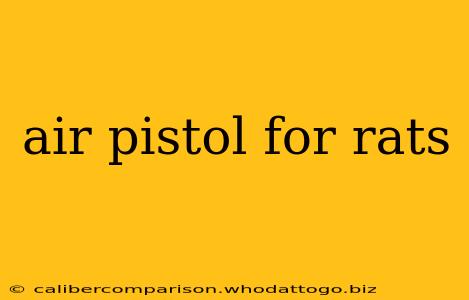Rats are a persistent and unwelcome pest, causing damage to property and posing health risks. While various methods exist for rat control, air pistols offer a potentially humane and effective solution for dealing with these rodents, particularly in situations where traps or poisons are unsuitable or undesirable. However, using an air pistol for rat control requires careful consideration, responsible use, and a solid understanding of local laws and regulations. This guide will explore the suitability of air pistols for rat control, discuss different types of air pistols, and outline important safety precautions.
Are Air Pistols Effective for Killing Rats?
The effectiveness of an air pistol against rats depends heavily on several factors: the type of air pistol, the caliber of pellet or BB used, the accuracy of the shot, and the distance to the target. High-powered air pistols, particularly those using .177 caliber pellets or larger, are more likely to be lethal to rats. However, even with a powerful air pistol, a poorly aimed shot might only injure the rat, causing unnecessary suffering. Therefore, responsible and accurate shooting is crucial. Remember, a humane kill is paramount. A poorly placed shot can cause prolonged suffering.
Choosing the Right Air Pistol for Rat Control
Several types of air pistols are available, each with its strengths and weaknesses:
Spring-piston Air Pistols:
- Pros: Generally affordable and readily available. They are powerful enough for small rodents like rats, especially with heavier pellets.
- Cons: Can require significant force to cock, leading to fatigue during extended use. Consistency in shot power can be less reliable than other types.
CO2 Air Pistols:
- Pros: More consistent shot power than spring-piston models. Usually easier to cock and operate. A wider range of pellet calibers might be available.
- Cons: Require CO2 cartridges, adding to the ongoing cost.
PCP (Pre-Charged Pneumatic) Air Pistols:
- Pros: Offer the highest power and consistency of all air pistol types. They're typically very accurate.
- Cons: Most expensive option, requiring a hand pump or tank to charge. Maintenance is often more complex.
Pellet Choice: Heavier pellets (.177 caliber or larger) are recommended for more effective rat control. Consider pellets designed for hunting or pest control.
Safety Precautions: Essential Considerations
Using an air pistol responsibly is paramount. Always prioritize safety:
- Know your target: Ensure you accurately identify your target before firing. Accidental injury to pets or other animals is a serious concern.
- Safe shooting environment: Choose a location where stray shots pose no risk to people or property. A backstop is crucial to prevent pellets from ricocheting.
- Eye and ear protection: Always wear eye and ear protection when using an air pistol.
- Proper handling: Follow the manufacturer's instructions for safe handling and storage.
- Legal considerations: Familiarize yourself with your local laws and regulations regarding air pistol ownership and use.
Alternatives to Air Pistols for Rat Control
While air pistols can be effective, other methods may be more suitable depending on the situation:
- Trapping: Effective and humane if traps are checked regularly.
- Poison: Use only as a last resort and follow all safety instructions.
- Professional pest control: Contacting a professional is often the best option for severe infestations.
Conclusion
Air pistols can be a viable option for controlling rat populations, but responsible use is critical. Choose a suitable air pistol and pellets, prioritize safety, and understand the legal aspects. If you are unsure about using an air pistol for rat control, consider alternative methods or consult a pest control professional. Always remember that humane treatment of animals should be paramount in any pest control strategy.

